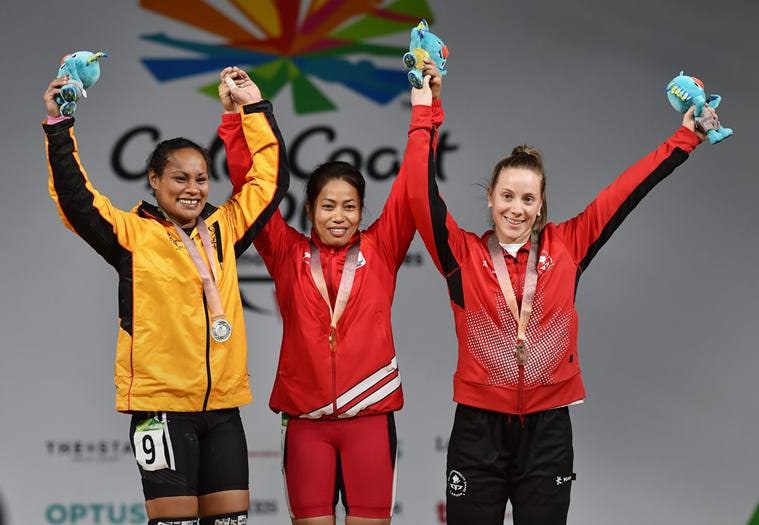 (From left) Silver medallist Dika with India’s gold winner Sanjita Chanu and Canada’s Rachel Leblanc-Bazinet. (Source: PTI)
(From left) Silver medallist Dika with India’s gold winner Sanjita Chanu and Canada’s Rachel Leblanc-Bazinet. (Source: PTI)
For the world, she is the pioneer of women’s weightlifting. In her country, she is a national treasure. For her villagers, she is the Dangal girl.
When the Bollywood movie based on Commonwealth Games gold medallist Geeta Phogat hit TV screens in Hanuabada, a coastal village on the outskirts of Papua New Guinea (PNG) capital Port Moresby, it was as if the story of Dika Loa Toua was being played out.
Dika is a weightlifting legend. At Sydney 2000, she became the first woman weightlifter at the Olympic Games. Dika was just 16 then. Nearly two decades later, the mother of two still remains a threat to her competitors, some of them half her age. On Friday, she was narrowly beaten to the gold by India’s 24-year-old Sanjita Chanu.
The silver, however, was good enough for the motley PNG crew, all in their colourful Hawaiian shirts, to break into an impromptu celebration on the lawns outside the weightlifting auditorium at the Carrara Stadium. “Dika has inspired a generation of athletes in PNG, breaking stereotypes and has proven that women can be highly successful in the sporting arena as well. Just like your girls have done in wrestling,” says John Dawanincura, secretary general, PNG Olympic Committee.
Also Read: Chanu is India’s medalname
Dawanincura, also the president of PNG’s weightlifting federation, says he was reminded of Dika when he saw Dangal two years ago because of the similarity of their achievements and the social structure in their villages.
“Both these girls (Dika and Geeta) took up a sport dominated by men. They challenged village stereotypes, trained in severe conditions and went on to win Commonwealth Games gold medals. If you see how their stories pan out, Dika is to us what those wrestling girls are to India,” he says.
Like Geeta, Dika chose a sport that was dominated by men and was ignored at the Olympics till the turn of the century. When Dika took up weightlifting, she was met with curious glares — not just because she was a girl trying to play what was perceived as a man’s sport but also because Hanuabada had virtually no weightlifting history.
Instead, the village was famous for producing cricketers. “Many players from the current PNG team, too, are from Hanuabada,” says Dika’s father, Toua. “Even I was a diehard cricket fan and did not focus much on weightlifting.”
While the village was glued to bat and ball, Dika was smitten by iron plates and barbells. If Geeta had her father as a coach, Dika found Douglas Mea. While Mahavir trained Geeta at a makeshift akhara, Mea and Dika practiced at a temporary gym built under a mango tree in the backyard of the coach’s house. “The theme of the careers of both these athletes is the same — determination to succeed in a field where no woman had before,” Toua says.
Geeta won the gold medal — India’s first in women’s wrestling — at the Delhi Commonwealth Games. Four years later, in Glasgow, Dika won her nation’s maiden weightlifting gold.
The similarities, however, do not end with their individual stories. Babita followed the path laid down by her sister and won medals at the national, continental and Commonwealth championships. In PNG, Dika’s sister Thelma, the 2016 Pacific Games champion, is gradually taking over the mantle.
Dika says she has a “vague idea” about the Phogats. “But to be honest, I have totally shut out myself from the outside world to focus on weightlifting,” she says. “I had to break the barriers to do well in my sport. And I am glad that a lot of the women, not just in weightlifting, have come up.”
Her compatriots, however, cannot stop comparing the two stories. Auvita Rapilla, secretary of PNG’s Commonwealth Games Association, says Dika’s success has turned Hanuabada into the country’s weightlifting hub. “Haven’t they (Phogats) inspired hundreds of women in their village to take up wrestling?” Rapilla says. “The story of your wrestlers is very popular in my village. I have only seen the trailer (of the movie). But you change the sport and the setting, and Dika could well be Geeta, it’s that similar.”